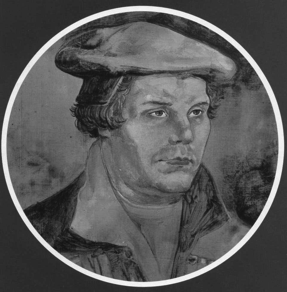Quiet Time
With food for thought by Marin Luther
Instead of a preface, "The Bible does not want to be transformed into the interpretation of him who studies it. It wants, conversely, to teach its content and will to him who studies it." (Luther) "But the thing, the sum of Scripture, is nothing else than the gospel of the justification of the sinner, which Luther heard from Scripture as the voice of God, and which snatched him out of the hell of the law and created him for new life. Therefore Luther inquires first of all of every passage of Scripture, what light falls upon it from the Gospel, whether it speaks here of the grace or of the wrath of God; only then does he inquire into the literal sense, as it arises from the foreign language. Luther thus did not rape Scripture, but took it for what it wants to be: testimony of revelation, God's voice. Thus Luther walks through Scripture as a hearer; the trees of its giant forest throw their fruit to him who shakes them. Everywhere Luther knows himself addressed; he struggles and suffers, rejoices and exults, dies and conquers with the arch-fathers and prophets, with the apostles and blood witnesses; he is always at the same time the sinner and the justified, the challenged and the wonderfully comforted, the conquered and the uplifted. From all Scripture the promise of Christ and the fulfillment in Christ resound toward him;..." (H. Fausel, D. Martin Luther, hänssler, p. 218) May the Lord similarly meet you afresh this week through His unique Word.
Note: It was very important to me to let you share in the life of Luther and his faith. Therefore the many quotations. Actually, you would have to put yourself first in the political and religious (mis-) conditions of the time to grasp the huge change. But first of all put value on listening to the bible text and to the speaking of the Holy Spirit - only then take time for the other things. If you do this with all your heart and eagerly seek after HIM, a reformation will take place in your life as well. "There is no greater thing than that we can believe that God speaks to us. If we believed that, we would already be blessed." (Luther) What no one can earn, God in His goodness gives: He accepts us because Jesus Christ has redeemed us. To atone for our guilt (sin), God sent His Son to bleed to death on the cross for us. Rom. 3:24-25
A whole week
Sunday: Where can I find a gracious God
Luther, as a young student, led a rollicking life like most of his time. Until the day a lightning strike nearly struck him. From that point on, he sought to please God. Without further ado, he entered a monastery and chastised himself to the extreme. Desperately he sought a "gracious" God! His burden of sin robbed him of all rest and joy. But all at once God opened his eyes while studying the Epistle to the Romans (Rom. 1:17), "But the righteous shall live by faith."
Read Rom. 6:1-14
- Have you experienced this wonderful deliverance in your life? Do you remember the deliverance when your soul left the torturous prison, when you were set free from your ungodliness, from your rebellion against God, from the great power of sin, from Satan and his tormentors?
- Where do you stand today? What are you building your righteousness upon? How does it show in your daily life, in your feelings, in your will, in your relationships, in your thoughts and actions? (See also table by N. Anderson in the appendix)
- What are you building your righteousness on? - For example on your church membership, your youth leadership, your more or less good life or ... (cf. Phil. 3:7-9) What is meant by faith? Do you agree with Luther: "The two belong together, faith and God." And "That on which you set your heart and on which you rely with your life, that is actually your God. So that having a God is nothing but what you trust in completely."
"The "righteousness of God" was not unknown to Luther, but he "hated" that word along with the God "who is just and punishes sinners and the unjust." Before him, after all, he could never attain to perfect assurance of life." ... "This brought me almost to frenzy. In conscience I was completely unsettled. Though it gave me anything but joy, I struggled with this word (Rom. 1:17) again and again. I was determined to find out what Paul meant. Finally, God had mercy! After days and nights of pondering, it came to me: I discovered how the words related to each other and therefore how they needed to be understood. "The righteousness of God is made manifest in the gospel, as it is written, "He that is righteous liveth by faith." Now I understood what "righteousness of God" means: it is the gift that makes man righteous, therefore he can live by faith in God. And it is precisely this hidden connection that is revealed in the Gospel."1
|
Monday: Of the Freedom of a Christian
"No pope, no bishop, indeed no man at all has the right to dictate a single word to a Christian."2
It was not long before the "common people" misapplied these statements. There was a bloody peasant uprising against all the authorities led by the "swarming" Thomas Müntzer. Misunderstood freedom - does it exist in our country? Smoke one, drink one, have a little sex, don't take the (street) laws so seriously, ... - STOP - we don't want any moral lectures! We are free, enlightened Christians, not unworldly bigots.
Read Rom. 8:1-17 carefully:
Whereof (or whereof not)
By what (or by what not) ... are YOU, as God's child, delivered?
Wherefore (or whereof not)
"The difference between the limited freedom of the I-man and the full freedom of the Christ-man is the difference in bondage. While the I-man strives for freedom as bondage, yet remains bound to himself, the Christ-man knows that he is bound to Christ. It is precisely in this that he recognizes his freedom: the saving access to the certainty of life. While the first is a sad reality, the second is a joyful event: "If this is not a rare joyful trade! The rich, unique, sincere bridegroom Christ marries the poor, despised, lost harlot. He thus puts her out of her misery and opens up a new life for her."3
"Freedom transports the person who finds life in faith in Christ to "paradise." In the midst of the hellish world with its demonized compulsions, the Christ-man lives in the freedom to which God created him. He uncovers the compulsive demonizations and learns to see the world - including himself - with the eyes of God. The life-dominating standards of good and evil do not rank for him as a means by which life could be mastered. He does not assert life in strict rules and inexorable laws. But neither does he assert it in well-demarcated free spaces. He stands by faith in loving union with the life opened to him through Christ. Securing existence and satisfying life are not the main concerns that constantly unsettle him. He knows that his life has its ultimate security in God's faithfulness and care. The Christian man does not need to develop himself first, for he already has it all: freedom."4
"The Christ-man is free to serve his fellow man. In doing so, he need not be driven by a demand of law, and he does not pursue a program of world improvement with his charity. He is not forced to act by an idea of charity. HE can respond to the need of his fellow man completely free-willingly."5
"Behold, this is the right spiritual, Christian liberty, which makes the heart free from all sins, laws, and commandments,
Which surpasses all other liberty as the heavens surpass the earth.
God grant that we may rightly understand and keep this freedom." (Luther)
Remaining days of the week, see PDF file
Introduction
for 8 days
- Anmelden oder Registrieren, um Kommentare verfassen zu können
Inhalte können automatisch übersetzt sein. Hilf mit durch deine Bearbeitung die Qualität der Übersetzung zu verbessern!



